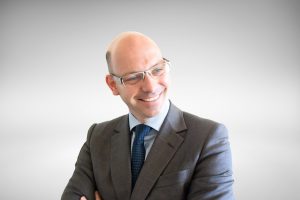Nothing can stop us from celebrating human rights defenders

A lawyer and an expert in international criminal law, Philippe Currat is the new Chair of the Board of the Martin Ennals Foundation. He shares his vision for the future of the Foundation, its responsibility towards Defenders in the COVID-19 era and shares some first insights for the 2021 Award ceremony.
Mr. Currat, you have chaired the Board of the Martin Ennals Foundation since early 2020. What motivated you to take this role?
I owe this motivation to Mr Abdul Aziz Muhamat, the 2019 Martin Ennals Laureate. Mr. Aziz is originally from Darfur, but he spent five years in a detention center for asylum seekers on the Isle of Manus in Papua New Guinea, controlled by Australia. This experience led him to become an active human rights defender. During the Award ceremony that year, I was impressed by Mr. Aziz’s exceptional character, his extraordinary career and the strength of his commitment. This ceremony was the starting point of my engagement with the Foundation, of which I joined the Board, before taking over the chairperson role in January 2020.
What is your mission as Chair and what is your ambition for the Foundation?
Geneva is the world capital of human rights, with the headquarters of the Office of the United Nations High Commissioner for Human Rights. But Geneva is also a city of peace, a gateway to the outside world. Therefore, to begin with, I would like to consolidate the links between the Foundation and our long-term partner, the City of Geneva, as well as with the Confederation, whose long-standing support is precious to us. Additionally, I wish to further develop our relations with the Canton of Geneva by continuing the meetings initiated last year between our laureates and secondary school students, thus emphasizing the importance of education in human rights. For almost thirty years, the Foundation has honored distinguished personalities across the world who are committed to all areas of human rights. We now aim to create a network for our former finalists and laureates in order to strengthen their individual and collective capacities and to increase cooperation among them.
Several leading personalities will join the Board of the Martin Ennals Foundation in 2021. Who are they?
The new members that will join the Board in 2021 align with the Martin Ennals Foundation’s mission. The Board has always had, at least, one former Finalist or Laureate on the Board. This is a way of staying connected with actors in the field working for Human Rights. Alejandra Ancheita, our 2014 Laureate, is a prominent Mexican lawyer and human rights activist who is leading the struggle for the rights of migrants, workers and indigenous communities in her country. Another addition is the renowned cartoonist Patrick Chappatte. His presence on our board will help us strengthen our Genevan roots. His work is at the forefront of the defense of the freedom of expression, allowing for our defenders to be heard.
Your commitment to human rights isn’t new. Where does this passion for justice and law come from?
I wanted to be a lawyer since I was a child and my commitment to human rights goes back to my university career. I devoted a large part of my studies to human rights and international humanitarian law. My academic career began at the same time as the creation of the international criminal tribunals (ICTY, ICTR and ICC). The emergence of this new branch of law, on the borders of public international law and criminal law, fascinated me immediately. As the Secretary General of the International Criminal Bar, I participated in the creation of the Bar of the International Criminal Court, which strengthens the fairness of the trial and the legitimacy of the ICC. Within my practice, our focus is mainly on criminal law, including juvenile law, as well as the law for foreigners and the right to asylum. These are opportunities to meet individuals whose stories of adversity, persecution and exile command admiration.
2020 has been marked by the Covid-19 pandemic. What is the impact of this crisis on the work of human rights defenders in the field?
The current pandemic exacerbates the inequalities at the heart of our Western societies, representing a major challenge for human rights. The health measures that States have taken to protect their populations legitimately do require restrictions of fundamental rights. This is acceptable as long as: they respond to a public interest, they are based on an adequate legal basis and are proportionate to the goal pursued. They cannot be considered legitimate when they affect the very foundations of these rights or serve as a façade for the implementation of repressive policies. These measures can question our relationship to freedom in an unprecedented way, especially when digital contact tracing tools might allow governments to trace their citizens’ every move.
It is still too early to take stock of the situation, but we know that the pandemic is making the work of human rights defenders in the field more difficult by exposing them to greater risk.
How does the Martin Ennals Foundation intend to respond in this context? How will you support previous laureates in their work?
One of the advantages of a small foundation like ours is that we are more flexible, resilient and innovative. The pandemic has led us to rediscover our mission of supporting human rights defenders this year. We have strengthened our ties with them and are working to improve their capacity to raise funds to continue their work. Access to health care, especially for those in detention, is also a concern, due to overcrowding, lack of hygiene, etc. that represent a particular risk to the transmission of the virus. We are therefore campaigning for the release of three of our former finalists and laureates who are currently imprisoned.
What about the 2021 Martin Ennals Award?
Nothing can stop us from celebrating human rights defenders! The Martin Ennals Award will be awarded in 2021, just like every other year. The members of the Jury and the Regional Panel involved in the nomination process were unanimous in saying that the Award is more necessary than ever to support our defenders. The urgency of our mission has increased this year, particularly to counter the numerous repressive measures that are being enacted in many countries under the guise of the fight against COVID-19. The health situation is also forcing us to rethink, with the City of Geneva, the format of our ceremony. We aim to bring it online thereby broadening the audience. We also aim to spread the spirit of Geneva even further, and to shed light on the violations of the fundamental rights which our defenders are fighting against, but which affect us all equally.

